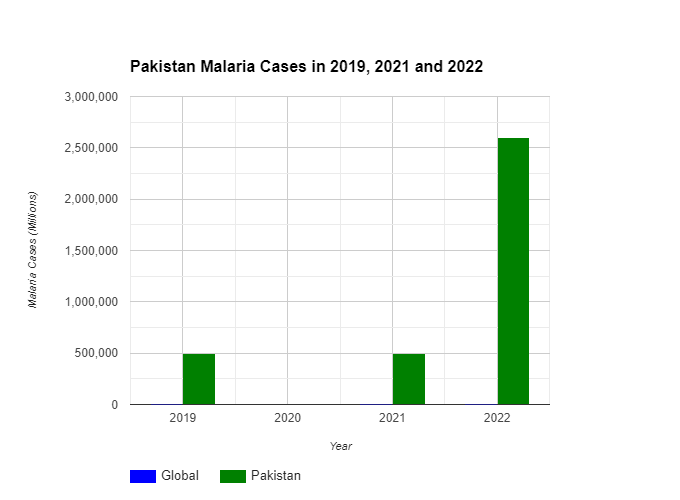Flooding Triggers Malaria Surge in Pakistan, WHO Warns
News Desk
Peshawar: The catastrophic flooding in Pakistan in 2022 has increased five-fold the burden of malaria cases in the country, reveals WHO’s annual malaria report, delving into the nexus between climate change and malaria.
Pakistan, which already bore a significant malaria burden, saw a staggering 2.6 million cases in 2022, compared to 500,000 cases in 2021. This alarming surge is attributed to the devastating floods that submerged vast swathes of the country, creating ideal breeding grounds for malaria-transmitting mosquitoes.
The WHO report highlights the intricate link between climate change and malaria transmission. Warmer temperatures and altered rainfall patterns, both consequences of climate change, are leading to the expansion of mosquito habitats and extending the malaria transmission season.
In the case of Pakistan, the unprecedented flooding provided an abundance of stagnant water, further amplifying mosquito breeding and exacerbating the malaria crisis. “The floods in Pakistan have created a perfect storm for malaria,” warned Dr Tedros Adhanom Ghebreyesus, Director-General of WHO.
“The combination of ideal mosquito breeding conditions, disrupted access to healthcare, and displacement of populations has created a fertile ground for the spread of this deadly disease.
”The surge in malaria cases has placed a severe strain on Pakistan’s healthcare system, which was already overburdened by the aftermath of the floods. With many healthcare facilities damaged or inaccessible, communities are struggling to access essential malaria prevention and treatment services.
“We are deeply concerned about the escalating malaria situation in Pakistan,” stated Dr Akhil Iyer, WHO’s Regional Director for Southeast Asia. “The WHO is working closely with the Pakistani government and its partners to strengthen malaria surveillance, expand access to diagnosis and treatment, and implement effective vector control measures.”
Extreme Weather Events
Changes in temperature, humidity, and rainfall can influence the behaviour and survival of the malaria-carrying Anopheles mosquito, the report made an observation. “Extreme weather events, such as heatwaves and flooding, can also directly impact transmission and disease burden. Catastrophic flooding in Pakistan in 2022, for example, led to a five-fold increase in malaria cases in the country,” reads the report.
Despite strides in expanding access to insecticide-treated nets and medicines to help prevent malaria in young children and pregnant women, more people were getting sick with malaria, according to a new report published by the World Health Organization (WHO).
In 2022, there were an estimated 249 million malaria cases globally, exceeding the pre-pandemic level of 233 million in 2019 by 16 million cases. Globally there were an additional five million malaria cases in 2022 over the previous year and five countries bore the brunt of these increases.
Pakistan saw the largest increase, with about 2.6 million cases in 2022, compared to 500,000 in 2021. Significant increases were also observed in Ethiopia, Nigeria, Papua New Guinea, and Uganda.
In addition to the disruptions caused by COVID-19, the global malaria response has faced a growing number of threats, such as drug and insecticide resistance, humanitarian crises, resource constraints, climate change impacts, and delays in programme implementation, particularly in countries with a high burden of the disease.
The report stressed a substantial pivot in the fight against malaria with increased resourcing, strengthened political commitment, data-driven strategies, and innovative tools. Innovation should focus on the development of more efficient, effective, and affordable products.
The added threat of climate change calls for sustainable and resilient malaria responses that align with efforts to reduce the effects of climate change. Whole-of-society engagement is crucial to building integrated approaches, it added.
The WHO report underscores the urgent need to address climate change and its impact on malaria transmission. Investing in climate-resilient health systems, strengthening malaria surveillance and control programmes, and promoting community-based malaria prevention efforts are crucial steps to mitigate the escalating malaria burden in Pakistan and other vulnerable regions.
Developing Countries Need Help: Pakistan Pushes for Increased Funding for Health Infrastructure
In addition to immediate relief efforts, the WHO is calling for a concerted global response to tackle the intertwined challenges of climate change and malaria. By investing in climate-resilient health infrastructure, promoting sustainable land use practices, and developing innovative malaria control tools, the world can work towards a future where malaria is no longer a threat to human health and well-being.

Comments are closed.